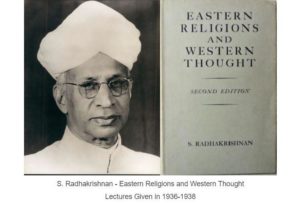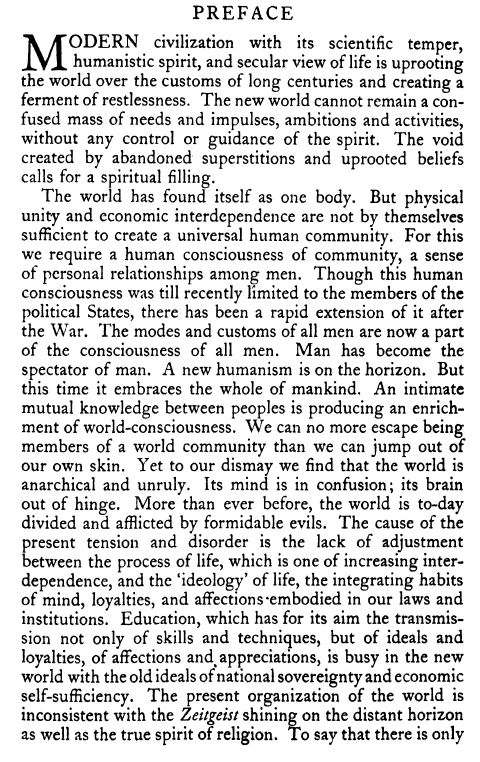




THE WORLD’S UNBORN SOUL*
* An Inaugural Lecture delivered before the University of Oxford on 20 October 1936. 2 Plato, Gorgias, 487.
Where I to express adequately my feelings at the honour this ancient University has done me by electing me to this newly founded Chair of Eastern Religions and Ethics, I should be tempted to become somewhat elaborate and perhaps tedious. Permit me therefore to express my gratitude to you with a plain ‘Thank you’.
Six years ago I spent a few months in this University. I was, however, a stranger within its gates, in it but not of it. I therefore appreciate the honour of being received into this fellowship of men and women united in their loyalty to the supreme ideal of truth and in their resolution to practise it for the welfare of humanity. When I look at the names of my colleagues and think of the learning and scholarship they represent, I realize my own limitations and can only plead for all the indulgence which they can offer and I very much need.
i
To attempt to understand one’s age is an undertaking full of difficulties. No one who is in it can take a detached view of it. However, as rational beings, we cannot help asking what modern life in all its intense activity and rapid change signifies, what the sense of it all is, for, as Socrates tells us, the noblest of all investigations is the study of what man should be and what he should pursue.2
Human history is not a series of secular happenings without any shape or pattern; it is a meaningful process, a significant development. Those who look at it from the outside are carried away by the wars and battles, the economic disorders and the political upheavals, but below in the depths is to be found the truly majestic drama, the tension between the limited effort of man and the sovereign purpose of the universe. Man cannot rest in an unresolved discord. He must seek for harmony, strive for adjustment. His progress is marked by a series of integrations, by the formation of
more and more comprehensive harmonies. When any particular integration is found inadequate to the new conditions, he breaks it down and advances to a larger whole. While civilization is always on the move, certain periods stand out clearly marked as periods of intense cultural change. The sixth century b.c., the transition from antiquity to the Middle Ages and from the Middle Ages to modern times in Europe, were such periods. None of these, however, is comparable to the present tension and anxiety which are world-wide in character and extend to every aspect of human life. We seem to feel that the end of one period of civilization is slowly drawing into sight.
For the first time in the history of our planet its inhabitants have become one whole, each and every part of which is affected by the fortunes of every other. Science and technology, without aiming at this result, have achieved the unity. Economic and political phenomena are increasingly imposing on us the obligation to treat the world as a unit. Currencies are linked, commerce is international, political fortunes are interdependent. And yet the sense that mankind must become a community is still a casual whim, a vague aspiration, not generally accepted as a conscious ideal or an urgent practical necessity moving us to feel the dignity of a common citizenship and the call of a common duty. Attempts to bring about human unity through mechanical means, through political adjustments, have proved abortive. It is not by these devices, not at any rate by them alone, that the unity of the human race can be enduringly accomplished.
The destiny of the human race, as of the individual, depends on the direction of its life forces, the lights which guide it, and the laws that mould it. There is a region beyond the body and the intellect, one in which the human spirit finds its expression in aspiration, not in formulas, a region which Plato enters when he frames his myths. It is called the soul of a being, the determining principle of body and mind. In the souls of men to-day there are clashing tides of colour and race, nation and religion, which create mutual antagonisms, myths, and dreams that divide mankind into hostile groups. Conflicts in human affairs are due to divisions in the human soul. The average general mind is respectful of the status quo and disinclined to great adventures, in which the security and isolation of the past have to be given up. It is not quite convinced by the moral collapse of the present system reposing on a ring of national egoisms held in check by mutual fear and hesitation, by ineffective treaties and futile resolutions of international tribunals. ‘Do you imagine’, asks Plato in the Republic, ‘that political constitutions spring from a tree or a rock and not from the dispositions of the citizens which turn the scale and draw all else in their direction ? . . . The constitutions are as the men are and grow out of their characters.’1 A society can be remade only by changing men’s hearts and minds. However much we may desire to make all things new, we cannot get away from our roots in the old. Let us go for some distance into the past and trace the ideas which rule the present.
II
The moulding influences of modern civilization, the spirit of science and rationalism, secular humanism and the sovereign State can be traced to the period of classical antiquity.
The Greeks laid the foundations of natural science for the European world. To analyse and explore, to test and prove all things in the light of reason, was the ambition of the Greek mind. No part of life is excluded from criticism by the dictates of the State or the scruples of the scriptures. The Greeks were the first to attempt to make life rational, to ask what is the right life for man and to apply the principles of reason and order to the chaos of primitive beliefs. Socrates warned us against the unexamined life and subjected the unanalysed catchwords of his time to careful scrutiny. He had firm faith that it is the nature of man to do right and walk straight. Human nature is fundamentally good, and the spread of enlightenment will abolish all wrong. Vice is only a miss, an error. We can learn to become good. Virtue is teachable.
- 1 viii. 544. See Jowett’s E.T.
Plato tells us that the universal or the general idea determines the nature of a particular individual and has greater reality than the latter. The philosopher is one who seeks to escape from the realm of the transient and contemplates the world of real being freed from all confusion and error, which infect the objects of everyday experience. The world of ideas is the only realm of certainty in which man can dwell secure, freed from opinion and probability. The most obvious example of such truth is to be seen in the general propositions of mathematics.
Yet the Greek could never forget that his main concern was with man in his full concrete reality. His bodily desires should be given free play, his mental powers full scope. Every side of his nature should be developed so as to produce a harmony in which no part tyrannizes over the rest. Here is a definition of happiness attributed to Solon and approved by Herodotus. ‘He is whole of limb, a stranger to disease, free from misfortune, happy in his children and comely to look upon. If in addition to all this he ends his life well, he is of a truth the man of whom thou art in search, the man who may rightly be termed happy.1
1 1-32, Rawlinson’s E.T., vol. i, p. 16; Solon prays to the Muses: ‘Let me at all times obtain good fortune from the blessed gods and enjoy honourable repute among men.’ Ischomachus in the Economics of Xenophon reckons among subjects of prayer ‘health, bodily strength, good repute in the city, kindly relation with friends, safety in war, increase of wealth’. An echo of this view is found in Aristotle, who defines happiness as ‘Prosperity combined with virtue; or independence of life; or that existence which, being safe, is pleasantest; or a flourishing state of prosperity and of body, with the faculty of guarding and producing this; for it may be said that all men allow happiness to be one or more of these things. If then happiness is this sort of thing, these must be parts of it; good birth, the possession of many friends, wealth, the possession of good children, the possession of many children, a happy old age: further the excellence of the body as health, beauty, strength, great stature, athletic power; also good repute, honour, good fortune, virtue. For a man would then be most independent, if he possessed both the personal and the external goods since besides these there are no others’ (Rhetoric, 1360 b). Jebbs’s E.T. Plutarch records a prayer, ‘put off old age, thou beautiful Aphrodite’.
The Greeks were not famous for their religious genius or moral fervour. We do not come across any hunger for the eternal or any passionate indignation against injustice. The main religion of the Greeks was the worship of the Olympian gods. Originally they were powers or forces of nature, though they soon became representative of human qualities. Dionysus, Aphrodite, Hermes, Artemis, each of them represents some quality of man. They were magnified human beings free from old age and death. Sometimes, as in Aeschylus, their justice and righteousness are insisted upon; but more often, as in Euripides, the gods display their might in a manner that defies all judgement by merely human standards, though it may be in conformity with the ways of natural forces. The sense of mystery was felt strongly in the presence of divine powers so long as they were conceived as natural forces, but it diminished somewhat when they were anthropomorphized. 1 f we measure the nature of a religion by the sense of mystery it induces in its followers, the mythology of the Greeks is not religion of a high quality. The Sophists questioned the right of what religion taught to control man’s conduct. It was at best a human convention.
Religious beliefs, however, were useful for political purposes. Some god or other guards every city with special care. The religious festivals were open to the Greeks and closed lo others. If Socrates was executed and Anaxagoras exiled for attacking traditional beliefs, it was because of their unpatriotic impiety. It was more political oppression than religious persecution. If the Sophists did not for long subvert the piety of the ancients, if Epicurus admitted the existence of the gods, even while he denied them any part in the government of the world, if the Stoics with the most pronounced rationalism still employed the old religious dynamic, it was because they knew the social value of religion.
Continue reading – Book in PDF file below.